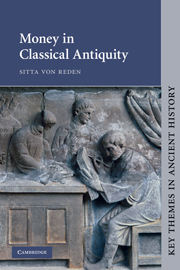Book contents
- Frontmatter
- Contents
- List of figures and tables
- List of maps
- Preface and acknowledgements
- Greek and Roman monetary system and coin denominations
- List of abbreviations
- Maps
- Introduction
- 1 Monetization: issues
- 2 Monetization: cases
- 3 Monetary networks
- 4 Cash and credit
- 5 Prices and price formation: issues
- 6 Prices and price formation: a case study
- 7 Sacred finance
- Epilogue: monetary culture
- Appendices
- Glossary
- Bibliographical essay
- References
- Index
Epilogue: monetary culture
Published online by Cambridge University Press: 05 August 2012
- Frontmatter
- Contents
- List of figures and tables
- List of maps
- Preface and acknowledgements
- Greek and Roman monetary system and coin denominations
- List of abbreviations
- Maps
- Introduction
- 1 Monetization: issues
- 2 Monetization: cases
- 3 Monetary networks
- 4 Cash and credit
- 5 Prices and price formation: issues
- 6 Prices and price formation: a case study
- 7 Sacred finance
- Epilogue: monetary culture
- Appendices
- Glossary
- Bibliographical essay
- References
- Index
Summary
In this book I have concentrated on the economic consequences of money and coinage in classical antiquity. But it is well known that money does not just affect economies but is a collective signifier through which individuals and societies construe their identities and lives. Surprisingly, very little positive has ever been said about the social impact of money. Texts from Greco-Roman antiquity, too, express their anxieties about money. Already before the first coins were minted, Solon compared virtue with false (monetary) wealth. ‘Many bad men are rich, good men poor; but we will not exchange virtue for these men's wealth. For the one lasts, whereas the other belongs now to this man and now to that’ (Solon frg. 4 (Bergk)). Kreon proclaimed in Sophocles' Antigone that money was a force that destroyed cities, uprooted men from their homes, twisted good minds and set them to the most atrocious schemes (Ant. 295 ff.), while Plato associated contact with money with lying and deceit:
It is pleasant enough for a country to have the sea nearby for the pleasures of everyday life, but in fact it is a ‘briny and bitter neighbour’ in more than one sense. It fills the city with trade, and moneymaking because of the retail breeds shifty and deceitful habits in a man's soul, and so makes a community distrustful and unfriendly within itself as well as towards the world outside
(Nom. 705a).- Type
- Chapter
- Information
- Money in Classical Antiquity , pp. 186 - 198Publisher: Cambridge University PressPrint publication year: 2010

